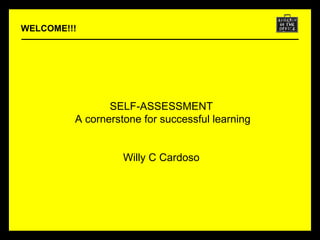
Self-assessment in language learning
- 1. SELF-ASSESSMENT A cornerstone for successful learning Willy C Cardoso WELCOME!!!
- 3. “ Autonomy is essentially a matter of the learner's psychological relation to the process and content of learning--a capacity for detachment, critical reflection, decision-making, and independent action” – Little (1991) “ The autonomous learner is a self-activated maker of meaning, an active agent in his own learning process. Learning is seen as the result of his own self-initiated interaction with the world.” – Rathbone (1971) “ Autonomy is a situation in which the learner is totally responsible for all the decisions concerned with his/her learning and the implementation of those decisions” – Dickinson (1993) Learner Autonomy
- 4. - Delegating tasks and decisions How can we develop responsibility and autonomy? - Consistent control On the part of the LEARNER - Motivation and self-confidence - Monitoring and evaluation - Cooperation and group cohesion On the part of the TEACHER - Sharing information with the learner
- 7. 2. Assessment of [general] competence
- 16. Practical classroom activities Reading assignment Monitoring the use of reading strategies
- 17. Practical classroom activities Speak to yourself Recording and analysing a short talk
- 18. Practical classroom activities Giving Feedback giving feedback on new activities Main goal collection information on student’s reaction You may experiment with testing your students’ reactions. If there is something new (a textbook, a game, or an activity) you want to try, you can go ahead and try it and then analyse the feedback you get from your learners. You may use questions like the ones below. Did you enjoy using……………………./ doing the…………………….activity? Did you feel you learnt more than usual with…………………………? Would you like to use/do……………………….again? Do you have any suggestions for other ways to use…………./ improve the activity? What did you feel most interesting or challenging about the new material/activity? What did you find unusual/boring about the new material/activity?
- 20. FURTHER READING Learner Autonomy Ágota Scharle and Anita Szabó (CUP) Language Assessment: principles and classroom practices H. Douglas Brown ( Pearson)
- 21. Willy C Cardoso [email_address] AuthenticTeaching.wordpress.com THANK YOU VERY MUCH!!! “ Education is the most powerful weapon which you can use to change the world” - Nelson Mandela